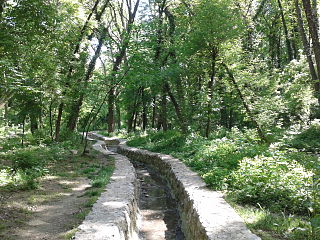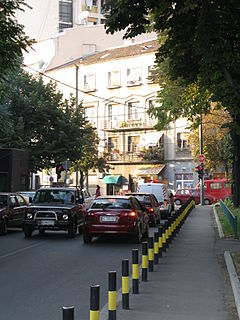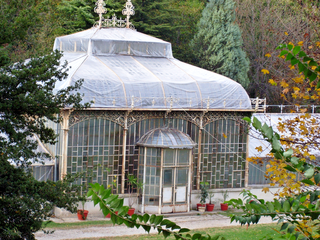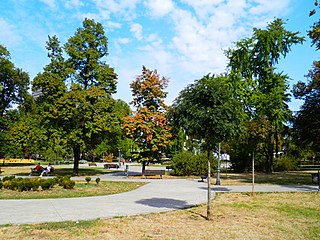 W
WAcademic Park is a park in Belgrade, the capital of Serbia. It is situated in the neighborhood of Studentski Trg, in the downtown. It is located in Belgrade's municipality of Stari Grad. Built from 1886 to 1889, Academic Park is one of the oldest parks in Belgrade.
 W
WByford's Forest (Serbian: Бајфордова шума, romanized: Bajfordova šuma} is a forest in Belgrade, the capital of Serbia. It is located in the Belgrade's municipality of Voždovac and until 2015 was known as Banjica Forest (Serbian: Бањичка шума, romanized: Banjička šuma}.
 W
WBelgrade Fortress, consists of the old citadel and Kalemegdan Park on the confluence of the River Sava and Danube, in an urban area of modern Belgrade, the capital of Serbia. It is located in Belgrade's municipality of Stari Grad. Belgrade Fortress was declared a Monument of Culture of Exceptional Importance in 1979, and is protected by the Republic of Serbia. It is the most visited tourist attraction in Belgrade, with Skadarlija being the second. Since the admission is free, it is estimated that the total number of visitors is over 2 million yearly.
 W
WBeo zoo vrt, also known as Vrt dobre nade, is a zoo located in Kalemegdan Park, downtown of Belgrade, Serbia. Founded on July, 12 1936, it is considered to be one of the oldest public zoos in southeastern Europe. The zoo covers 7 hectares and it houses a collection of approximately 150 animal species, with close to 2,000 individuals, making it the largest collection in Serbia. It's also recognized as one of the most visited tourist attractions in Belgrade.
 W
WCity Park or Zemun Park is a park in Zemun, a neighborhood of Belgrade, the capital of Serbia. Located on the rim of the Old Core of Zemun, it is considered today as one of the symbols of Zemun and one of the most beautiful parks in Belgrade.
 W
WČubura, Serbo-Croatian pronunciation: [t͡ʃǔbura]) is an urban neighborhood of Belgrade, the capital of Serbia. Located in Belgrade's municipality of Vračar, it is a synonym of the city's bohemian life.
 W
WHyde park is a park in suburban Belgrade, Serbia. It is situated in the municipality of Savski Venac, on the northern slopes of Topčider Hill. It consists of two parts: woodland with tracks for running, and another with appliances for fitness and recreation. The park is triangular in shape. Hyde Park was built in the 1930s. Nearby are Partizan Stadium, House of Flowers and Prokop station.
 W
WJevremovac Botanical Garden is the botanical garden of the University of Belgrade and also a surrounding urban neighborhood of Belgrade, the capital of Serbia. The garden is located in Belgrade's municipality of Stari Grad and is an administered by the University of Belgrade's Biology School.
 W
WKalemegdan Park or simply Kalemegdan, is the largest park and the most important historical monument in Belgrade. It is located on a 125-metre-high (410 ft) cliff, at the junction of the River Sava and the Danube. Its name is formed from the two Turkish words: Kale and archaic word of Turkish origin megdan.
 W
WKarađorđe's Park is a public park and an urban neighborhood of Belgrade, the capital of Serbia. While the park itself is located in Belgrade's municipality of Vračar, majority of what is today considered the neighborhood of Karađorđev Park is since 1957 located in the municipality of Savski Venac.
 W
WKošutnjak is a park-forest and urban neighborhood of Belgrade, the capital of Serbia. It is divided between in the municipalities of Čukarica and Rakovica. With the adjoining Topčider, it is colloquially styled "Belgrade's oxygen factory". The 1923 Belgrade's general plan, in which one of the main projects regarding the green areas was forestation of the area between Topčider and the city, envisioned a continuous green area Senjak – Topčidersko Brdo – Hajd Park – Topčider – Košutnjak, which was formed by the 1930s. This continual forested area makes the largest "green massif" in the immediate vicinity of Belgrade's urban tissue.
 W
WLipov Lad is an urban neighborhood of Belgrade, the capital of Serbia. It is located in Belgrade's municipality of Zvezdara.
 W
WLipovica Forest, or only Lipovica, is a forest in the outer, metropolitan area of Belgrade, Serbia. It is located in Belgrade's municipalities of Voždovac and Barajevo.
 W
WMakiš is a forest and an urban neighborhood of Belgrade, the capital of Serbia. It is located in Belgrade's municipality of Čukarica.
 W
WManjež Park is a public park situated in the centre of Belgrade, the capital of Serbia.
 W
WMemorial Park Jajinci is located on the territory of Belgrade municipality Voždovac, on the 11th kilometre on the way to the Аvala mountain. It was built in the location of the military shooting range used by the Armed Forces of the Kingdom of Yugoslavia, and which during the Second World War became the place of the terrible suffering of the innocent population on the territory of the occupied Serbia.
 W
WPark Aleksandrov is a park in Belgrade, a capital of Serbia. It is situated in the sole center of the city, along the main Kralja Milana street. Named Devojački Park until 2017, it is located in the municipality of Stari Grad.
 W
WPark Bristol is a park in Belgrade, the capital of Serbia. It is situated in the neighborhood of Savamala, between the incoming and outgoing platforms of the Belgrade Main Bus Station. It is located in the municipality of Savski Venac.
 W
WPark Gavrilo Princip is a park in Belgrade, the capital of Serbia. Originating from 1836, it is one of the oldest parks in the city and in 1864 it was declared the first public park in Belgrade. Named Financial Park until 2017, it is located in the municipality of Savski Venac.
 W
WPark Luka Ćelović is a park in Belgrade, the capital of Serbia. It is situated in the neighborhood of Savamala, and was called "Park at the Faculty of Economics" until 2004 when was officially renamed. It is located in the municipality of Savski Venac.
 W
WPark Milutin Milanković is a park in Belgrade, a capital of Serbia. It is situated on top of the Vračar hill, in the municipality of Savski Venac and was the former location of the Belgrade Observatory from 1891 to 1929.
 W
WThe Park of Friendship in New Belgrade is one of the largest parks in Belgrade.
 W
WPark Proleće or Park Vojvoda Vuk is one of the parks in downtown Belgrade, the capital of Serbia. It is located in the municipality of Stari Grad. It is also colloquially called Park on Topličin Venac. The roughly triangularly shaped park is one of the smallest in the central area of Belgrade, with an area of 3,700 m2 (40,000 sq ft).
 W
WPark Republika Srpska is one of the newest parks in Belgrade, the capital of Serbia. It is located in the municipality of New Belgrade.
 W
WPioneers Park is a park in Belgrade, the capital of Serbia. Developed from the royal garden, which itself was a successor of a much older garden, it is today one of the central city parks. It has been open for public since 1944. The park has been declared a botanical natural monument.
 W
WPark Rozali Morton is a park in Belgrade, the capital of Serbia. It is located in the municipality of Savski Venac.
 W
WStepin Lug or Gaj is a park-forest and, for the most part, non-residential suburban settlement of Belgrade, the capital of Serbia. It is located in Belgrade's municipalities of Voždovac and Zvezdara. It is part of the forest complex Stepin Lug-Baba Velka-Torlak-Jajinci, which is the largest wooden area in Belgrade.
 W
WŠumice is an urban neighborhood of Belgrade, the capital of Serbia. It is located in Belgrade's municipality of Voždovac. It is also the name of a park-forest within the neighbourhood.
 W
WTašmajdan Park, colloquially Tašmajdan or simply just Taš, is a public park and the surrounding urban neighborhood of Belgrade, the capital of Serbia. It is located in Belgrade's municipality of Palilula. In 2010–2011 the entire park saw its largest reconstruction since its creation in 1954.
 W
WTopčider is a forest park and an urban neighborhood of Belgrade, the capital of Serbia. It is divided between the municipalities of Čukarica, Rakovica and Savski Venac. Being close to downtown, it is one of the major locations for relaxation, picnics and fresh air for the citizens of Belgrade.
 W
WVozarev Cross is located in Belgrade, in the park between Vojvode Šupljikca Street and Mileševska Street, and it was erected in 1847. It represents the immovable cultural property as the cultural monument. The famous Belgrade bookseller and a printer, Gligorije Vozarević, erected a wooden cross decorated with icons in his own field at Vračar. The contemporaries interpreted the erection of the cross not only as the symbol of the faith and religion, but also as the symbol of the liberation – the symbol of the victory. For that reason, this cross is considered as the first public monument in Belgrade. The ruined wooden cross was replaced by the Belgrade Municipality in 1933 with one in red artificial stone. The part of Belgrade was named after it Crveni Krst.
 W
WZvezdara is a municipality of the city of Belgrade. The municipality is geographically hilly and with many forests. According to the 2011 census results, the municipality has a population of 148,014 inhabitants.
 W
WZvezdara Forest is a park-forest in Belgrade, the capital of Serbia. Majority of the forest is located in the municipality of Zvezdara with only the small northernmost section being on the territory of Palilula. After Košutnjak and Topčider, Zvezdara is the largest forest in the urban zone of Belgrade and with them, the most important source of the oxygen for the city. While the Košuntjak-Topčider complex is being called the "Belgrade's oxygen factory", Zvezdara forest bears the moniker "left lung of the city".